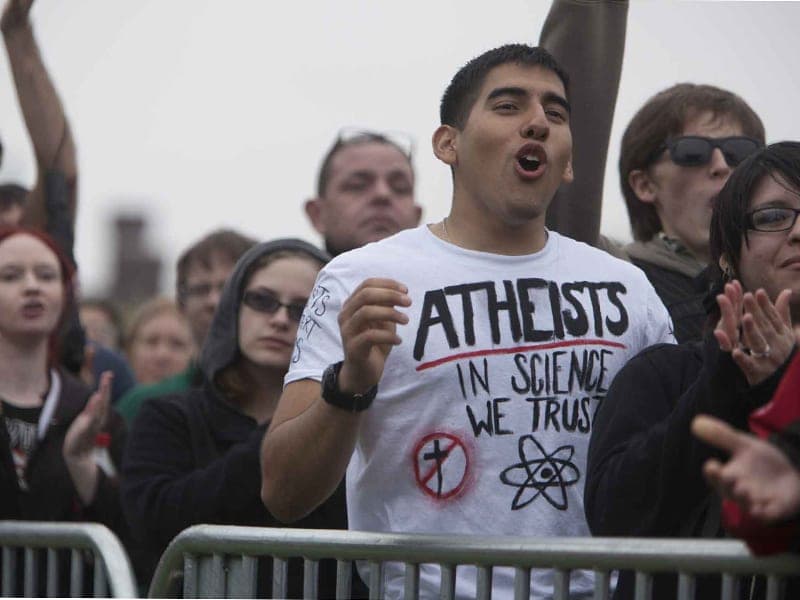There’s been a plethora of stories of late outlining how conservative Evangelical Christians have been very pleased with their relationship to President Donald Trump, and how well he has been serving their agenda.
Now, another significant and fast-growing religious constituency in America is clamoring for some of his attention: “Nones,” meaning Americans with no religious affiliation, who are now more than twenty percent of the country’s 245 million adults.
As for the Evangelicals, it’s easy to see why, despite Trump’s dwindling approval ratings overall, they remain fairly solidly in his camp.
Almost immediately upon entering office he reinstated the ‘Mexico City Policy,’ which bans using U.S. foreign aid for abortion-related activities, pleasing both Evangelicals and Catholics. Next came an executive order on religious liberty, telling the IRS to weaken enforcement of the Johnson Amendment which prohibits tax-exempt charitable organizations from political speech.
Most recently, Trump tweeted that he intended to remove all transgendered people from the U.S. armed forces. While the Department of Defense and military brass didn’t have a heads-up, leading Evangelical Christians said the idea came from them and they knew at least two weeks prior to the tweet it was in the works.
On July 28, four secularist organizations – American Atheists, the American Humanist Association, the Center for Inquiry and the Secular Coalition for America – issued a joint statement calling for “dialogue with the Trump administration.”
That day was the first time a letter they had sent to Trump on March 17, 2017 was made public. In that letter, the groups urged “President Trump to continue the Obama Administration’s policy of regularly engaging with the nontheistic community.”
The four signatory organizations urged Trump to call upon them as a resource, so they can work together to “ensure religious freedom and inclusion for all Americans throughout your tenure as President of the United States.”
A lack of response from Trump, combined with some of the anti-secular rhetoric by Attorney General Jeff Sessions calling secularists unfit for government, as well as Trump’s uncritical embrace of Evangelical Christians whom he acknowledges as his biggest supporters, have led the leaders of these organizations to challenge the White House publicly.
Casey Brescia, communications associate and spokesman for the Secular Coalition for America, said that while Obama was “incredibly inclusive to the secular community” and consistent about “mentioning people of no faith in positive terms,” “the silence we’ve received from them (the Trump administration) is surprising and troubling.”
Brescia admitted that, given Trump’s campaign rhetoric, they weren’t sure what to expect from his presidency, but “that said, we were certainly hopeful.” At a political level, based on a growing population, they thought “we could make a compelling political case to them.”
David Silverman, the president of American Atheists, said, “President Trump needs to realize that the tide has turned on religion in America. Our community is growing, while the ranks of the extremists he has aligned himself with continue to shrink. Atheists demand equality, respect, and a seat at the table in American politics, and we will fight at every step to secure those goals.”
Perhaps surprisingly, the secularists say they may be able to do business with Trump on at least one front also shared by many Evangelicals and the U.S. Conference of Catholic Bishops: The importance of the U.S. Commission on International Religious Freedom.
While the bishops and other Christian organizations tend to focus on the plight of beleaguered and persecuted Christians abroad, these secular organizations also focus on persecution of people of no faith and atheists.
According to the International Humanist and Ethical Union, 13 countries consider atheism a capital offense punishable by death. Brescia says, “If the United States is going to be a champion for religious freedom around the world, it must be ready to defend people of all faiths and none.”
Amy Couch, communications manager for the American Humanist Association, said in an email to Crux, her organization would like to talk with the president “about the ongoing effort to overturn blasphemy laws in countries which maintain them, and about protecting nontheists globally from religiously motivated discrimination.”
Brescia said, “True religious freedom is a shield that protects religious belief, not a sword that imposes those beliefs on others.” His fear, he said, is that the White House has conflated “religious freedom” with “religious privilege.”
While they are facing silence from the White House, these organizations continue to reach out to other groups with shared interests and concerns. Sometimes those interests converge with groups otherwise at odds with them.
Secularists might not seem like the likeliest of allies of Catholic and Christian organizations, but as Robyn Blummer, President and CEOof the Center for Inquiry, said in an email to Crux, “there are many places our interests overlap with Catholic organizations, though, obviously they diverge too.”














